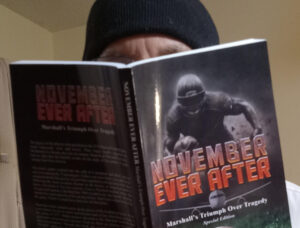November 15, 1970— The evening air in Huntington, West Virginia, carried a heavy silence as people made their way to the Memorial Field House. This grand building, usually echoing with the cheers of basketball fans, was now the gathering place for a community in mourning. The large crowd that filled the seats was not there to celebrate a game, but to remember the seventy-five souls lost in a devastating plane crash the night before.
The Marshall University football team, along with its coaching staff and supporters, had been on that ill-fated chartered jet. The aircraft’s crash into the side of a mountain, followed by a fiery explosion, had extinguished seventy-five vibrant lives in an instant. The shock of the tragedy had left the town of Huntington and the Marshall community in a state of disbelief and profound grief.
As the Field House filled, a palpable sense of stillness and numbness pervaded the air. More than 7,000 people, their faces etched with sorrow, sat in silent solidarity, united in their loss. The usual lively chatter and laughter that preceded events in this venue were absent. Instead, there was a shared, unspoken understanding of the pain each person carried in their heart.
At the podium, Donald Dedmon, the acting president of Marshall, stood before the grieving crowd. His presence brought a solemn yet comforting focus to the gathering. Dedmon was acutely aware of the raw emotions that filled the arena, as the harrowing images from the crash site were still vivid in the minds of those with ties to the school and the city.
In his address, Dedmon acknowledged the overwhelming sorrow that had befallen Marshall and Huntington. Yet, in a caring and empathetic manner, he chose not to dwell on the devastation of the tragedy. Instead, he sought to offer a glimmer of warmth amidst the coldness of grief.
Dedmon began to recount a memory from just a week before the crash, a moment that highlighted the passion and pride of the Marshall football team. He painted a picture of young athletes, full of life and dreams, embodying the spirit of their university and community.
His words, though tinged with sadness, carried a message of hope and remembrance. In that moment, Dedmon’s speech became a heartwarming tribute to the lives lost, a reminder of the joy they had brought to those around them, and a beacon of resilience for a community determined to honor their memory and rebuild from the ashes of tragedy.
The following passages from the transcript of the speech that Dedmon delivered at the Sunday memorial service reveals so much about the heart and passion of the 1970 team. Here are excerpts from his speech:
“We cannot soon forget that horrible picture framed by the broken pines of a West Virginia hillside. But another picture comes to my mind which I know I shall never forget either—a happy picture. It was the picture of your loved ones and mine, a picture which revealed the best that there is in man.
There in a Fairfield Stadium dressing room a little over a week ago sat Marshall’s players and Marshall’s coaching staff paced the floor. The invitation to speak to our boys greatly honored me and what I saw moved me deeply. Our coaches walked among the benches and had a quiet, private word with each player. I never could have believed that had I not been there, how badly our boys wanted to win that day. Two openly wept, others were ill from the tension.
There were white students and black students, but they all wore the big green. The game marked a signal point in their life. Small in number but incredibly determined in spirit, they meant to win that final home game. And win they did—magnificently! It is that picture I want to begin to recall this evening.
Marshall is better for having had them all!”
Author’s note: In its final home game of the 1970 season, the Thundering Herd rallied in the fourth quarter to beat Kent State 20-17. Excerpts of Dedmon’s speech courtesy of the Herald-Dispatch daily newspaper website (NC).


